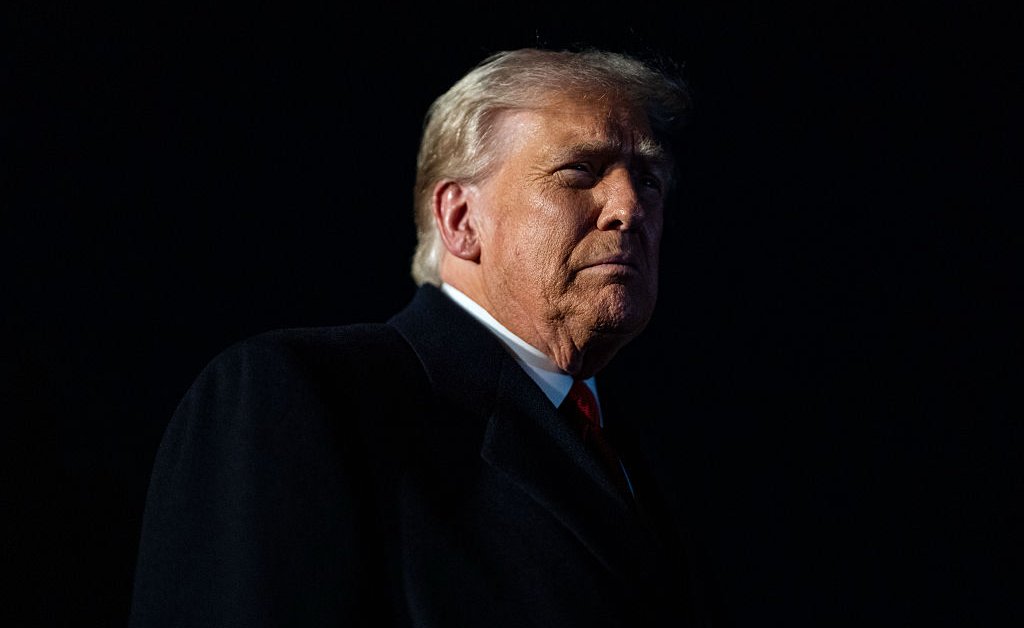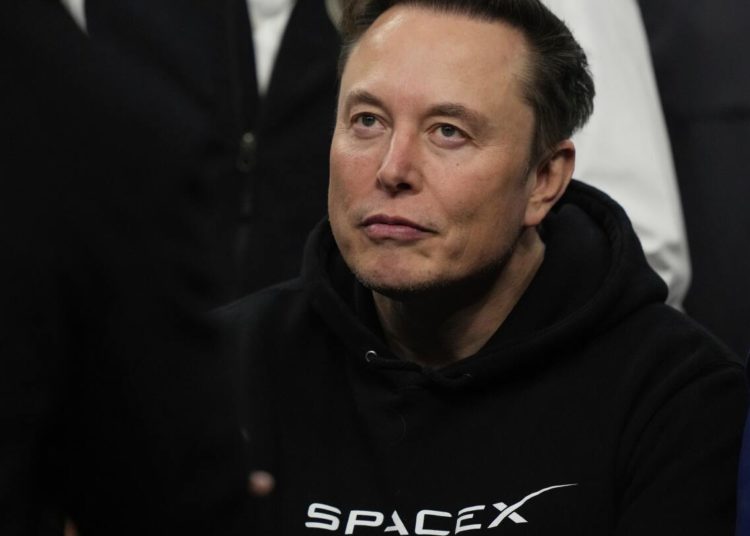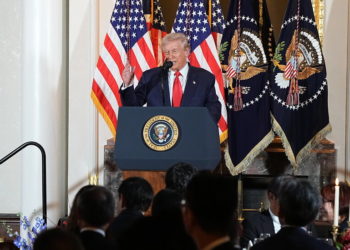The Constitution is clear: Donald Trump cannot have a third presidential term. But that hasn’t stopped him and his allies from talking about it.
“I would love to do it,” the U.S. President told reporters aboard Air Force One en route to Japan on Monday, while he also falsely claimed: “I have my best numbers ever.” When pressed if he’s ruling out the possibility of a third term, Trump kept his answer ambiguous: “Am I not ruling it out? I mean, you’ll have to tell me.”
Trump also dismissed a theoretical scenario in which he might run for Vice President in 2028 and return to the Oval Office via his running mate resigning. “You’d be allowed to do that, but I wouldn’t do that,” he said. “I think the people wouldn’t like that. It’s too cute. It’s not—it wouldn’t be right.”
Trump’s latest comments come after his former chief strategist Steve Bannon, one of the most vocal proponents of Trump serving a third term, told the Economist last week that there is a “plan” to circumvent the 22nd Amendment—which explicitly limits a President to two terms. “Trump is going to be President in 2028,” Bannon said, “and people just ought to get accommodated with that.” Bannon did not disclose the details of the plan, only saying that there are “many different alternatives” and that the pathway would be revealed “at the appropriate time.”
Whether Trump actually plans to run again for President, in defiance of the Constitution, merely bringing up the possibility so much, some observers say, may be strategic in its own right.
Keeps Republicans on their toes
For one, continuous talk of a third term may help Trump to try to maintain his relevance and power over the GOP, CNN’s Aaron Blake analyzed.
Second terms “have not been good” to U.S. Presidents, John C. Fortier and Norman J. Ornstein wrote in a 2007 book, largely because the 22nd Amendment “ensures that a reelected President becomes a lame duck, contributing to the diminution of the office in the view of other Washington institutions.”
While he still largely has the support of Republican leaders, Trump has started to see some intraparty pushback in his second term. Former staunch defenders like Rep. Marjorie Taylor Greene (R, Ga.) have grown increasingly independent, particularly since July, when columnist Matt K. Lewis wrote for the Hill that the Trump era seemed beginning to end. From Trump’s base-infuriating handling of the Jeffrey Epstein case to his apparent signs of aging, Lewis wrote, it’s become “no longer absurdly premature” to start thinking about who might succeed him. Term limits alone, Lewis wrote, set “an expiration date on his relevance that even the most obsequious loyalists can’t ignore forever.”
The Bulwark’s Will Sommer also wrote in September that the right-wing media ecosystem, which helped catapult Trump to the presidency, appears to be “moving on” and “looking beyond” him.
But Trump’s repeated comments about a third term, CNN’s Blake suggests, effectively deter Republicans from “making plans for a reality that won’t include him,” especially other potential 2028 alternatives.
Bannon, speaking to NBC News in April, said any direct talk of a campaign ahead of Trump’s future political plans risks offending the MAGA movement and would invite “total and complete rejection” from the GOP base. “Trump is MAGA; MAGA is Trump.”
Keeps Democrats on their toes
But keeping himself in focus could also help Trump’s eventual GOP successor.
In the Monday gaggle with reporters aboard Air Force One, Trump repeated his suggestion that Vice President J.D. Vance and Secretary of State Marco Rubio could be worthy successors, but his own third-term talk somewhat stalls Democrats—who are still looking for their own candidate to rally around—from planning a strategy for their own 2028 campaign.
Distracts
Some have seen Trump’s third-term talk as a diversionary tactic of trolling the left.
“His ability to infuriate his opponents is one of his greatest strengths while the Democrats are in disarray,” pro-Trump political strategist Dave Carney told the New York Times. “Trump excels by keeping people off kilter and uncomfortable.”
The View co-host Ana Navarro called Trump the “distractor-in-chief” and accused him of bringing up the idea of staying in office beyond his term limits earlier this year to draw attention away from a controversy at the time over leaked messages among top officials in his Administration.
In an opinion piece for the Advocate, senior editor John Casey wrote that Trump’s latest remarks were “all part of Trump’s constant craving for attention and deflection, his ‘look over here, not over there.’”
Casey argued that while the nation “fixates on the constitutional impossibility of a third Trump term, he’s hoping we’ll ignore the chaos he’s already creating,” including the government shutdown, the effect of his tariffs on the American economy, and other pressing domestic issues.
He’s serious
Strategy aside, multiple polls have shown that a majority of Americans believe Trump is serious about running again in 2028, despite constitutional term limits.
And there’s precedent to not dismissing Trump’s denials. Trump, on the 2024 campaign trail, repeatedly downplayed ties to the controversial conservative playbook Project 2025, but now many of his second-term Administration’s policies mirror it.
Former Trump staffer Alyssa Farah Griffin, who worked for Trump’s communications team before resigning near the end of his first term, has said that the President’s comments should be taken seriously, especially if “certain people” in Trump’s orbit like Bannon echo it.
“I know Donald Trump well enough to believe this isn’t a guy who’s going to be a lame duck after the midterms,” Griffin said on The View, of which she is also a co-host, on Monday. “He’s not going to let the center of gravity shift to J.D. Vance or Marco Rubio while he fades into the distance. It’s something to keep an eye on. I find it concerning.”
The post Why Trump Keeps Talking About a Third Term appeared first on TIME.




